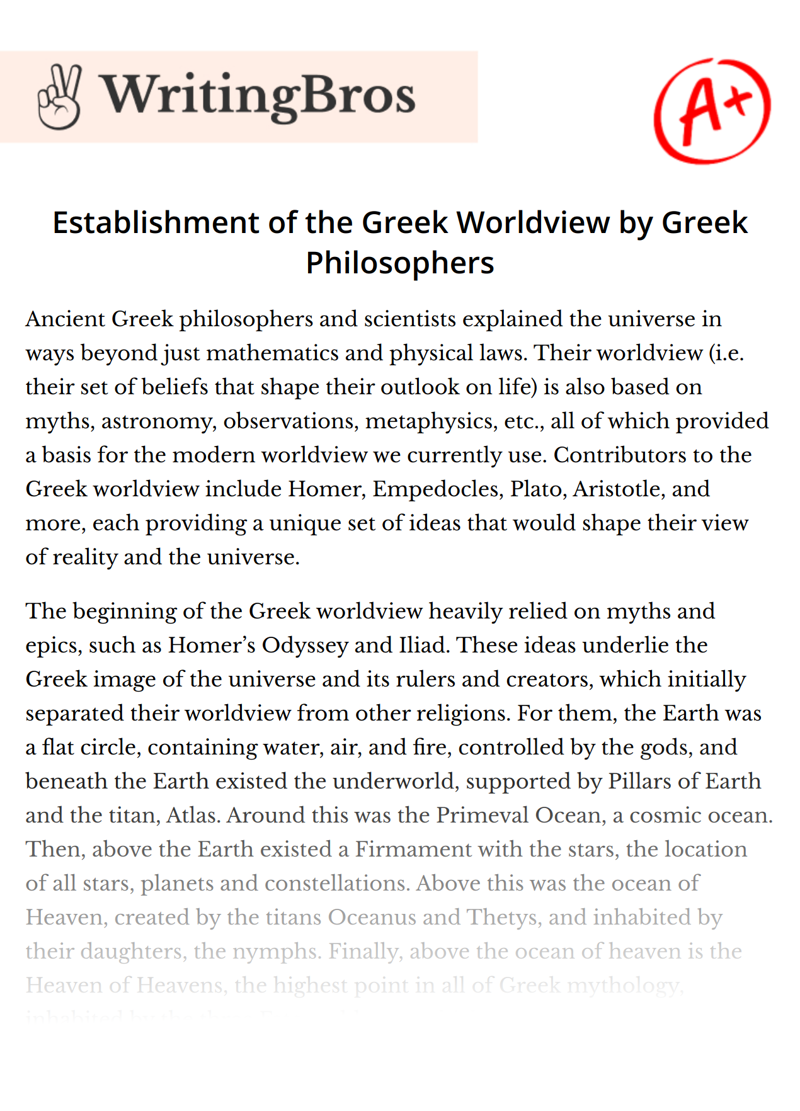Establishment of the Greek Worldview by Greek Philosophers

Ancient Greek philosophers and scientists explained the universe in ways beyond just mathematics and physical laws. Their worldview (i.e. their set of beliefs that shape their outlook on life) is also based on myths, astronomy, observations, metaphysics, etc., all of which provided a basis for the modern worldview we currently use. Contributors to the Greek worldview include Homer, Empedocles, Plato, Aristotle, and more, each providing a unique set of ideas that would shape their view of reality and the universe.
The beginning of the Greek worldview heavily relied on myths and epics, such as Homer’s Odyssey and Iliad. These ideas underlie the Greek image of the universe and its rulers and creators, which initially separated their worldview from other religions. For them, the Earth was a flat circle, containing water, air, and fire, controlled by the gods, and beneath the Earth existed the underworld, supported by Pillars of Earth and the titan, Atlas. Around this was the Primeval Ocean, a cosmic ocean. Then, above the Earth existed a Firmament with the stars, the location of all stars, planets and constellations. Above this was the ocean of Heaven, created by the titans Oceanus and Thetys, and inhabited by their daughters, the nymphs. Finally, above the ocean of heaven is the Heaven of Heavens, the highest point in all of Greek mythology, inhabited by the three Fate goddesses, which is supported by the Pillars of Heaven and Atlas (“Greek cosmology” 9). Their mythology includes details of the birth of the gods, their brawls, lives, and roles, how the universe came to be, and a highly confounding idea of fate, the “force which rules everything, even the gods” (“Greek Cosmology” 9).
In order to understand the relevance of this mythology, it is important to study the context in which it exists. The pre-Socratic cosmologies of Ancient Greece incorporated ideas from philosophers such as Democritus, Anaxagoras, and Empedocles. The best-understood philosophy is that of Empedocles, who claimed that matter is composed of combinations of four elements, each with two significant qualities: Earth (cold and dry), Water (cold and wet), Air (hot and wet), and Fire (hot and dry). Additionally, for Empedocles, the two divine forces, Love and Strife control the four elements and their separation or combination (Alexander 1549). However, when attempting to study Earthly events, ancient Greeks began relying more on science and calculations, leaving behind the focus on the gods and their influence.
After Empedocles, around the fourth century BC, Plato’s philosophy began dominating ancient Greek beliefs and views. Plato goes beyond the senses, thought, and observations, as he focuses on metaphysics and idealism — the idea that every object has an ideal form that can be generalized. His notorious “Myth of Er” views the Earth as being surrounded by spindles containing the planets, and thus he focused on two-dimensional figures (Alexander 1549). On the other hand, Aristotle, whose views arose in the mid-fourth century BC, emphasizes the importance of observations, and says that in order to understand the universe, each of its objects and aspects must be studied separately (T. et al “Aristotle vs. Plato”). He began studying the world as three-dimensional figures, and specifically he began the idea of having an eternal cosmic sphere containing rotating, ethereal planets and stars, surrounding a stationary Earth. Outside of this comic sphere was vacant space, and life on Earth was a result of the rotation of the “heavenly spheres” which “impart motion and change to the four elements” (Alexander 1549). Thus, after Aristotle’s contributions, the Greeks reached the idea that the universe was finite, surrounded by divine, spherical 3D planets and stars that rotate around the fixed Earth, explaining night and day, seasons, etc.
The Greek beliefs and worldviews continued to evolve eventually giving rise to Epicurus’ ideas of infinite atoms making up matter, and then Claudius Ptolemy’s Ptolemaic system. Ptolemy used both mathematics and astronomy to prove his ideas about the universe. His system reinforced Aristotle’s idea of Earth being the center of the universe (geocentricism) but added the concept of planets rotating around it in a circular motion termed an epicycle. Ptolemy said that planets rotated in a specific order and that the center of each planet’s rotation also rotated along the Earth in equidistant, two-dimensional spheres which contain fixed, ethereal material. (Alexander “Ptolemaic System”) He said that the spheres would rotate regularly as “disorder and no uniformity were alien to divine things”, and since the divine gods were the ones controlling the universe, order was the planets’ natural motion (“The Greek Worldview”). Later on, he began studying the spheres as three-dimensional “hollow spheres, arranged one within another and surrounding the Earth” and each rotating sphere “carried the planet or Sun or Moon in its orbit around the Earth” (“The Greek Worldview”).
Following Ptolemy came several philosophers and scientists, each of which contributed their ideas, ultimately evolving the Greek worldview into the contemporary one we follow today. With the rise of the Islamic civilizations, Ptolemy’s ideologies were modified and extended, resulting in ““Arabic” numerals, the place-value system of calculating using zero, and many trigonometric techniques” (“The Greek Worldview”). Additionally, the Greek mythology was opposed by some, who placed emphasis on the Abrahamic religions and the belief that there is only one God who created the universe. However, it is without a doubt that the Greek worldview contributed fundamental ideas (whether metaphysical, mathematical, scientific, etc.) that shaped the contemporary worldview we learn about and use daily.
Cite this Essay
To export a reference to this article please select a referencing style below

